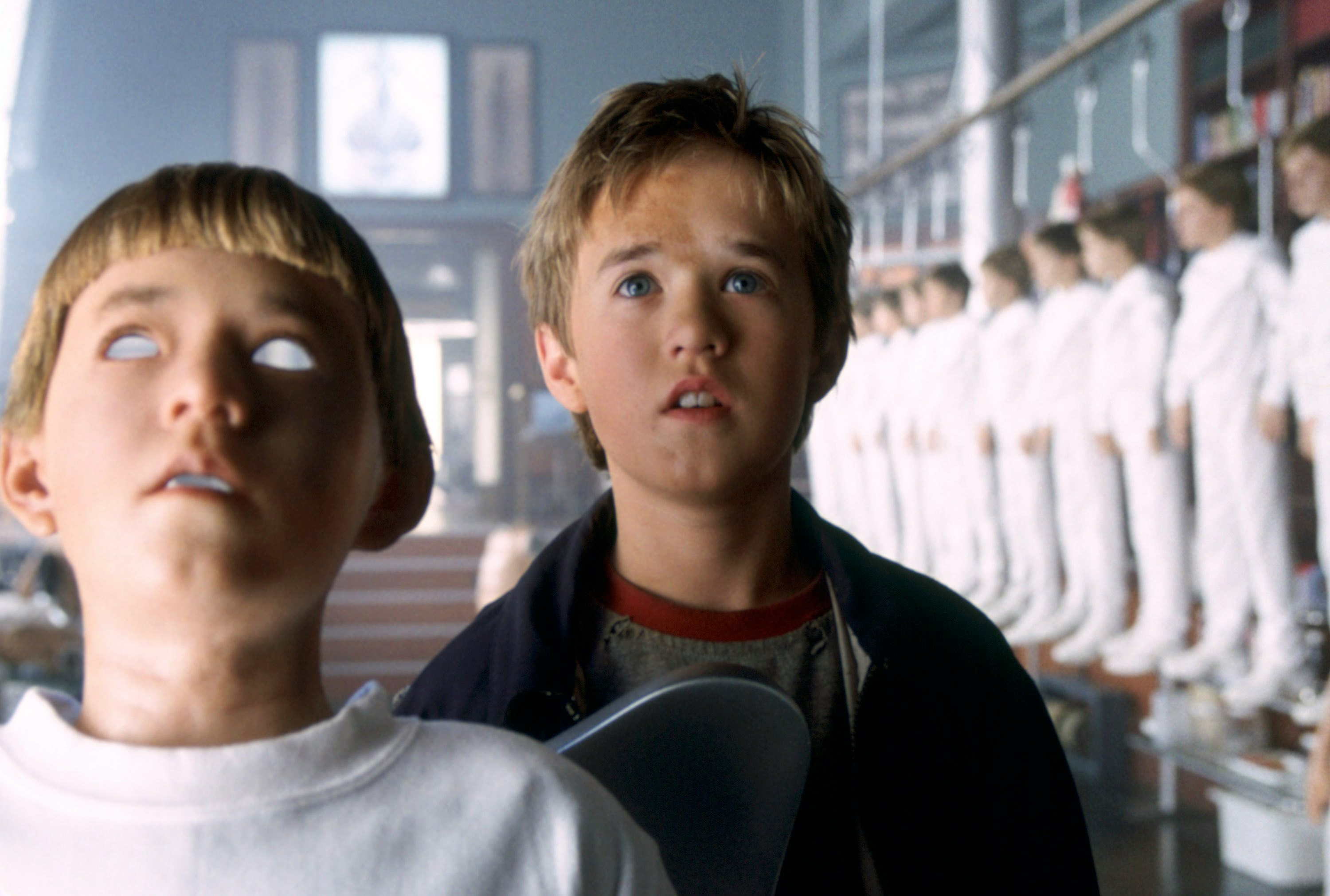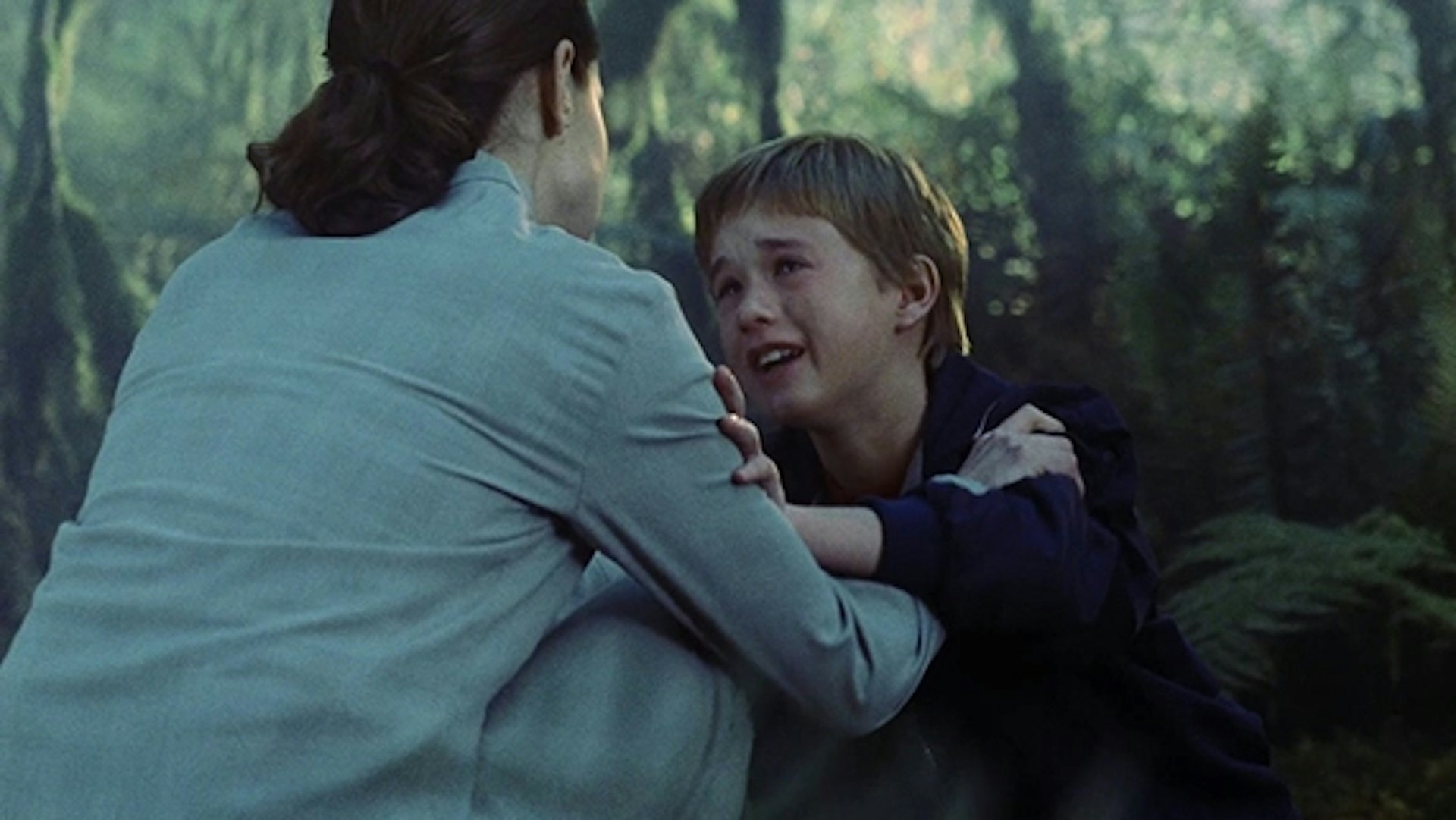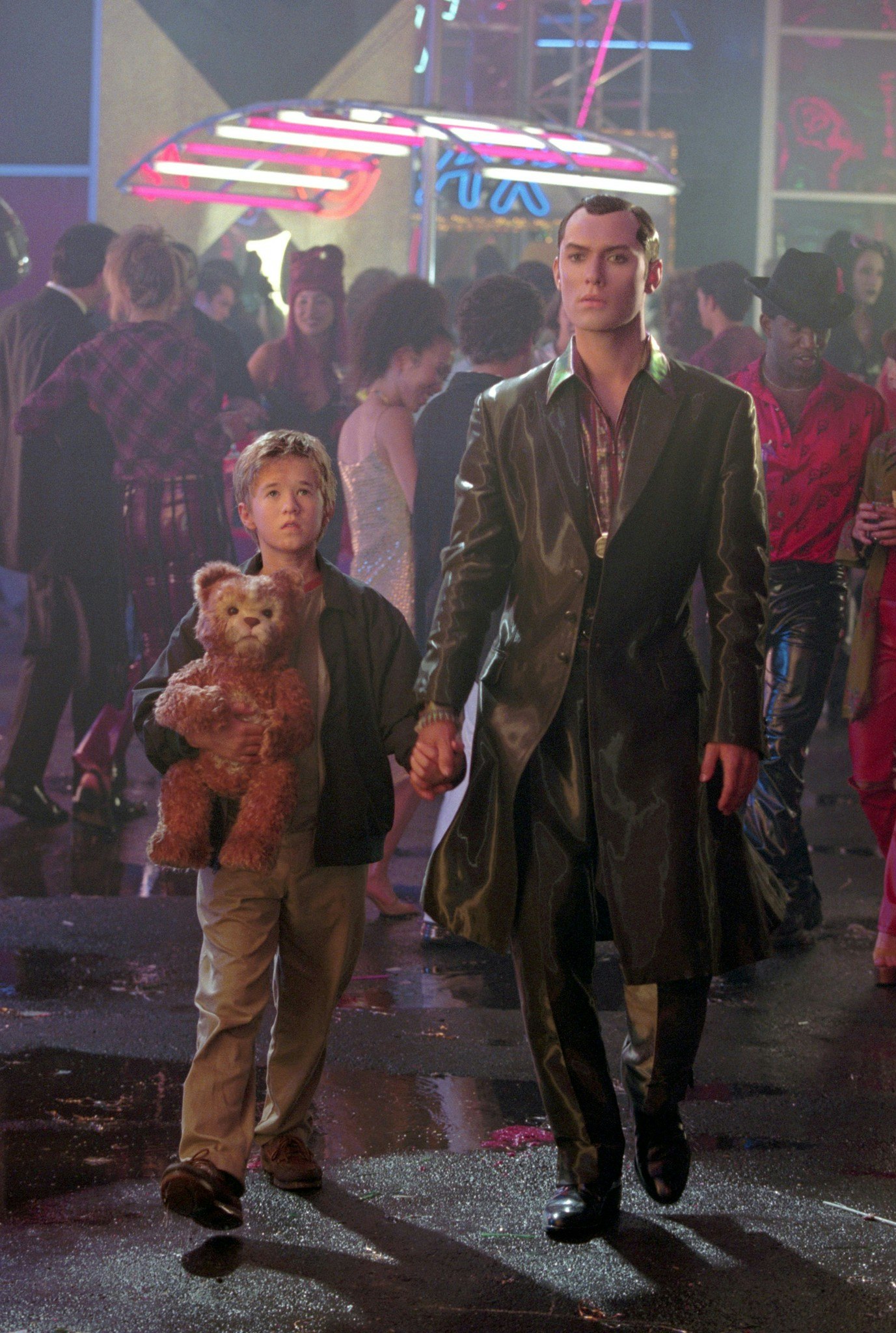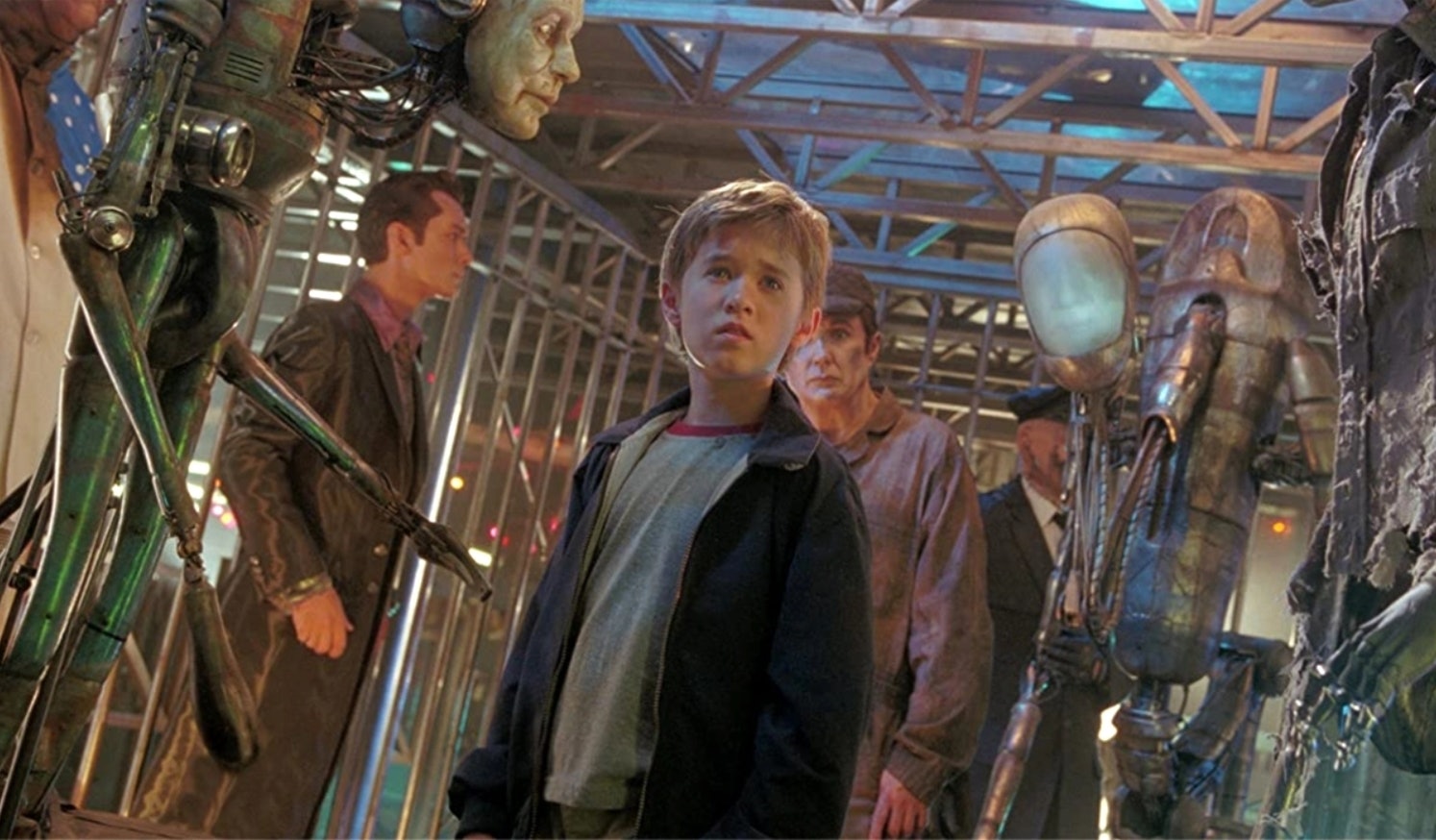
Pinocchio is hot right now.
Or at least tweaking and twisting the Italian fairy tale for modern audiences is. Pinocchio got a live-action treatment starring Tom Hanks and Cynthia Erivo on Disney+ in early September, and Pinocchio will come to life once again, reimagined as a stop-motion animated musical fantasy drama by Guillermo del Toro, for Netflix.
But long before Pinocchio remakes were cool, Steven Spielberg dove into uncharted stylistic territory on a leap of faith bestowed by Stanley Kubrick with A.I. Artificial Intelligence, a futuristic spin on Pinocchio that was equal parts disturbing and lovey-dovey.
Cinematic legend has it that Kubrick began adapting the short story “Supertoys Last All Summer Long” by sci-fi author Brian Aldiss sometime in the late 1970s, but the movie languished in purgatory. Kubrick didn’t believe special effects technology was advanced enough to make his dreams for the dystopian Pinocchio tale come true, at least until Steven Spielberg’s Jurassic Park debuted. At long last, A.I. Artificial Intelligence was finally leaping from the page onto the big screen.
But legend also has it that not even the pull of an iconic Spielberg and Kubrick pairing, or the child superstardom of Haley Joel Osment fresh off M. Night Shyamalan’s The Sixth Sense, or even Jude Law’s enduring sex symbol status, could save the movie from being woefully underrated and misconstrued by critics and audiences alike.
On its surface, A.I. Artificial Intelligence doesn’t shy away from its inspiration. A boy carved out of a tree by a lonely craftsman is traded in for a shinier model: David (Osment), a robo-boy prototype gifted to couple Monica and Henry Swinton (Frances O’Connor, Sam Robards), who are mourning their comatose son, Martin, amid a rapidly declining human population in a world ravaged by climate change. David is designed to not only imprint on his human parents, but programmed to fiercely love Monica and Henry above all others, effectively replacing their emotional need for Martin.
But artificial love embedded in code is a shadow of love authentically experienced, given, or received. David discovers this when Martin (Jake Thomas) miraculously awakens from his coma, and David is tossed on the side of the road like a worn-out toy.

Cursed with an everlasting desire to obtain love from Monica and Henry, David becomes obsessed with becoming a “real boy” so he can be as wanted as Martin. His journey leads him to anti-robot “flesh fairs” spearheaded by a cruel carny (Brendan Gleeson), robo-sex work districts occupied by the likes of disingenuously charming Gigolo Joe (Jude Law), and anthropomorphized Google search bars voiced by Robin Williams, all in the hopes of finding the Blue Fairy from Pinocchio who will convert him from mechanical to organic. The question of whether David receives his happily ever after at the end of A.I. has divided critics and audiences for two decades.
If an edgy recounting of Pinocchio isn’t a draw, or if the eco-horror genre doesn’t appeal to you, then perhaps watching a film that’s wholly unique because of its production is enough to get you running to Amazon Prime Video. A.I. successfully blended the seemingly disparate storytelling sensibilities of Steven Spielberg and Stanley Kubrick into a cohesive piece that was neither too stereotypically morose for a Kubrick movie, nor too stereotypically mawkish for a Spielberg movie.

Spielberg has repeatedly said that, as soon as Kubrick mentioned his A.I. adaptation to him in 1985 and persuaded him to take the reins, he knew it was essential to do justice to Kubrick’s ultimate passion project.
“I felt that was a breakthrough in our relationship,” Spielberg told the Los Angeles Times in an interview ahead of A.I.’s 2001 theatrical release. “The story wasn’t as important to me as was the fact that for the first time since we had met in 1979, he was actually telling me a story he was considering for himself as a filmmaker.”
When Kubrick died, Spielberg went against his own directorial impulses to create a movie that honored Kubrick’s original vision. Spielberg may have been the one behind the camera, handling casting and supervising the final cuts, but all the storyboards he referenced in A.I.’s creation had been supervised by Kubrick in the early ’90s.

A.I. Artificial Intelligence was nominated for Best Visual Effects and Best Original Score at the 74th Academy Awards, and received numerous critical accolades. Roger Ebert gave the film three stars, deeming it “wonderful and maddening.” A decade later, Ebert revisited his original assessment, tacking on the final star. A.I. eventually wound up on Ebert’s “Great Movies” list.
American audiences, on the other hand, had mixed opinions, giving A.I. a C+ grade when surveyed by CinemaScore. Audiences may have expected something more overtly “adult themes with a child’s POV,” like Spielberg’s Empire of the Sun, and less superficially centered on “childlike naïveté and wonder” than Spielberg’s Hook or E.T. the Extra-Terrestrial.
Screenwriter Ian Watson speculated in an interview with Moon Milk Review in 2010 that while A.I. was quite successful worldwide, the film was “too poetical and intellectual in general for American tastes.” Ouch. He also said American critics mostly misunderstood the film because they thought that the final 20 minutes “were a sentimental addition by Spielberg, whereas those scenes were exactly what I wrote for Stanley and exactly what he wanted, filmed faithfully by Spielberg.”
In the A.I. audience divide, you either see it as one of Spielberg’s finest films (and, posthumously, one of Kubrick’s), or as a regrettable filmmaking collaboration. Watch it yourself and figure out where you stand in this ongoing dispute.
A.I. Artificial Intelligence is available to stream on Amazon Prime Video.







